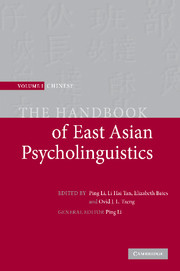Book contents
- Frontmatter
- Contents
- List of figures
- Notes on contributors
- Preface
- Introduction: new frontiers in Chinese psycholinguistics
- Part I Language acquisition
- Part II Language processing
- 14 Word-form encoding in Chinese speech production
- 15 Effects of semantic radical consistency and combinability on Chinese character processing
- 16 Eye movement in Chinese reading: basic processes and crosslinguistic differences
- 17 The Chinese character in psycholinguistic research: form, structure, and the reader
- 18 Perception and production of Mandarin Chinese tones
- 19 Phonological mediation in visual word recognition in English and Chinese
- 20 Reading Chinese characters: orthography, phonology, meaning, and the Lexical Constituency Model
- 21 Processing of characters by native Chinese readers
- 22 L2 acquisition and processing of Mandarin tones
- 23 The comprehension of coreference in Chinese discourse
- 24 Lexical ambiguity resolution in Chinese sentence processing
- Part III Language and the brain
- Epilogue: a tribute to Elizabeth Bates
- References
- Name index
- Subject index
14 - Word-form encoding in Chinese speech production
Published online by Cambridge University Press: 05 June 2012
- Frontmatter
- Contents
- List of figures
- Notes on contributors
- Preface
- Introduction: new frontiers in Chinese psycholinguistics
- Part I Language acquisition
- Part II Language processing
- 14 Word-form encoding in Chinese speech production
- 15 Effects of semantic radical consistency and combinability on Chinese character processing
- 16 Eye movement in Chinese reading: basic processes and crosslinguistic differences
- 17 The Chinese character in psycholinguistic research: form, structure, and the reader
- 18 Perception and production of Mandarin Chinese tones
- 19 Phonological mediation in visual word recognition in English and Chinese
- 20 Reading Chinese characters: orthography, phonology, meaning, and the Lexical Constituency Model
- 21 Processing of characters by native Chinese readers
- 22 L2 acquisition and processing of Mandarin tones
- 23 The comprehension of coreference in Chinese discourse
- 24 Lexical ambiguity resolution in Chinese sentence processing
- Part III Language and the brain
- Epilogue: a tribute to Elizabeth Bates
- References
- Name index
- Subject index
Summary
Introduction
Theories of speech production are based, to a large extent, on the Indo-European languages (e.g. Bock & Levelt, 1994; Dell, 1986; Levelt, Roelofs & Meyer, 1999). Although crosslinguistic checks of the theories have been attempted, they were carried out primarily within that language family. The purpose of this chapter is to describe some attempts to extend production research outside this family, to the Chinese language, in particular, Mandarin Chinese or Putonghua.
To produce a word, a speaker must convert a meaning to a phonetic code that can be executed by the articulatory organs. The conversion is not a one-step job, but consists of several processing levels, each involving the construction of a linguistic representation that is appropriate for (characteristic of) that level. It is typically assumed that the representations consist of two parts, a constructed hierarchical frame, and a retrieved set of discrete units which are inserted into slots in the frame. The following levels of processing have been postulated (Levelt, Roelofs & Meyer, 1999). Initially at the syntactic level, a sentence frame is constructed which is composed of a number of categorically labeled slots. The syntactic code of the word, called its “lemma,” is also retrieved. The lemma is a memory representation that uniquely identifies the word and stores its syntactic properties such as gender, number, person, tense, etc. When the lemma is retrieved, these syntactic properties determine the word's slot in the sentence frame.
- Type
- Chapter
- Information
- The Handbook of East Asian Psycholinguistics , pp. 165 - 174Publisher: Cambridge University PressPrint publication year: 2006
- 3
- Cited by



